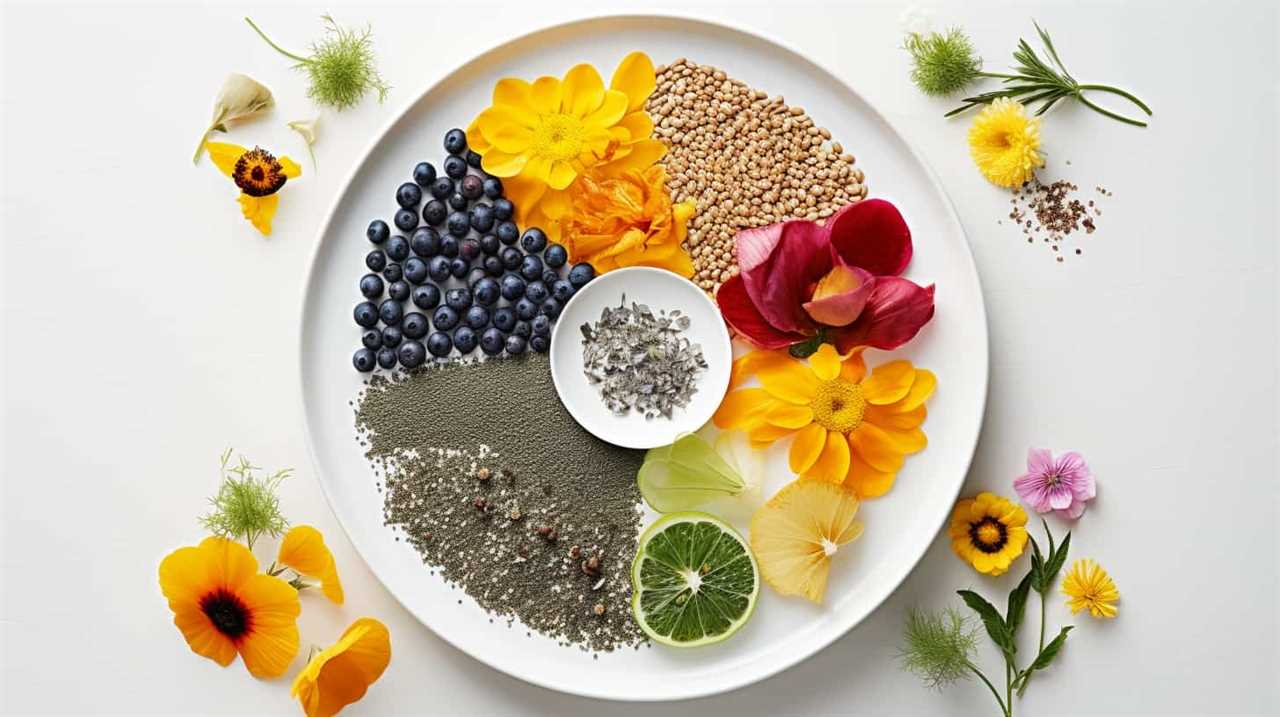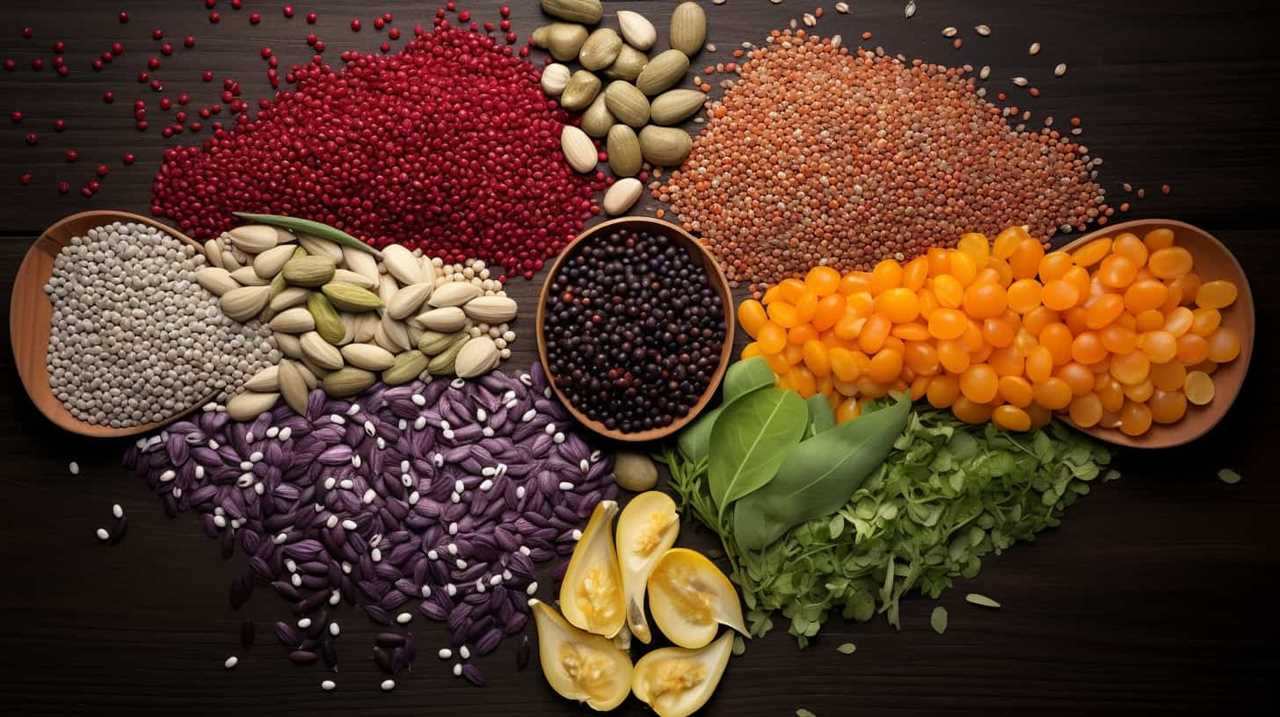As we explore the topic of consuming seeds and the possible health risks associated with it, we discover numerous concerns that require our focus.
From allergic reactions to gastrointestinal issues, interactions with medications, and even the potential choking hazard, there are numerous factors at play.
Our aim is to shed light on these risks, providing you with evidence-based information to empower your choices and safeguard your well-being.
Together, let’s explore why seed consumption may pose health risks and discover how we can navigate this landscape with knowledge and care.

Key Takeaways
- Chia seeds can cause allergic reactions, including skin rashes, swelling, and difficulty breathing. Immediate medical attention is necessary if these symptoms occur.
- Gastrointestinal issues such as bloating, gas, and stomach cramps can result from consuming chia seeds due to their high fiber content.
- Chia seeds may interact with blood thinners, increasing the risk of bleeding. Consultation with healthcare providers is advised for individuals taking blood thinners.
- Chia seeds can pose a choking hazard, particularly for children, older adults, and individuals with swallowing difficulties. Sufficient moisture should be present when consuming chia seeds to prevent them from swelling in the throat.
Allergic Reactions to Chia Seeds
Chia seeds can cause allergic reactions in some individuals. Allergies to chia seeds are rare but can occur due to cross-reactivity with other seeds such as sesame or mustard. Symptoms of chia seed allergies may include skin rashes, itching, swelling, difficulty breathing, and gastrointestinal discomfort. If someone experiences these symptoms after consuming chia seeds, it’s crucial to seek medical attention immediately.
Treatment for chia seed allergies typically involves avoiding all forms of chia seeds and other seeds that cross-react. Antihistamines may be prescribed to relieve symptoms, and in severe cases, epinephrine may be necessary to treat anaphylaxis.
It’s essential to read food labels carefully and inform healthcare professionals about chia seed allergies to prevent accidental exposure.
Gastrointestinal Issues From Chia Seed Consumption
We have observed that consuming chia seeds can lead to gastrointestinal issues. Some individuals may experience digestive discomfort after consuming chia seeds, including bloating, gas, and stomach cramps. This may be due to the high fiber content of chia seeds, which can cause digestive disturbances in some people. Chia seeds absorb liquid and expand in the stomach, which can lead to feelings of fullness and discomfort.
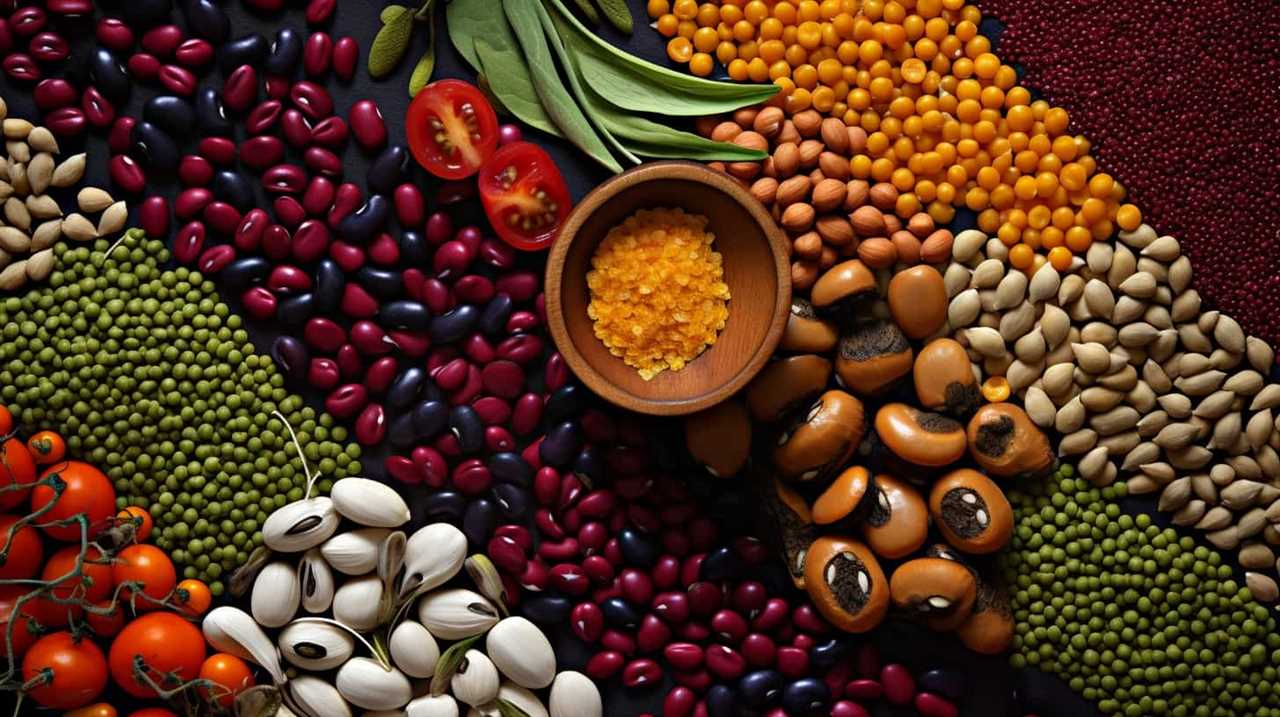
It’s important to be aware of potential side effects of chia seeds, despite their many health benefits. Chia seeds may interfere with the absorption of certain nutrients and can potentially contribute to nutrient deficiencies if consumed in large quantities. Additionally, chia seeds have the potential to impact blood sugar levels, so individuals with diabetes or those monitoring their blood sugar should be cautious when incorporating chia seeds into their diet.
These gastrointestinal issues and potential nutrient deficiencies and impact on blood sugar levels should be considered when consuming chia seeds. Moving forward, it’s important to explore the interactions between medications and chia seeds to ensure the safety and effectiveness of both.
Interactions With Medications and Chia Seeds
How do chia seeds interact with medications?
Chia seeds are known for their numerous health benefits, but it’s important to consider potential interactions with medications.

One concern is the potential interaction with blood thinners. Chia seeds contain omega-3 fatty acids, which have natural blood-thinning properties. When consumed in large amounts, chia seeds may enhance the effects of blood thinners, increasing the risk of bleeding. It’s advisable for individuals taking blood thinners to consult with their healthcare provider before incorporating chia seeds into their diet.
Additionally, pregnant women should also exercise caution when consuming chia seeds. Although chia seeds are generally considered safe during pregnancy, they may have a mild laxative effect, which could be problematic for some pregnant women. It’s best to consult with a healthcare provider before including chia seeds in the diet during pregnancy.
Potential Choking Hazard of Chia Seeds
Although chia seeds offer numerous health benefits, it’s important to be aware of the potential choking hazard they can pose. Chia seeds, when consumed dry and in large quantities, can absorb liquid and expand in the throat, potentially leading to choking. To ensure safe consumption, it’s recommended to soak chia seeds in liquid before consuming or to mix them into foods with sufficient moisture.
Here are some important points to consider regarding the potential choking hazard of chia seeds:
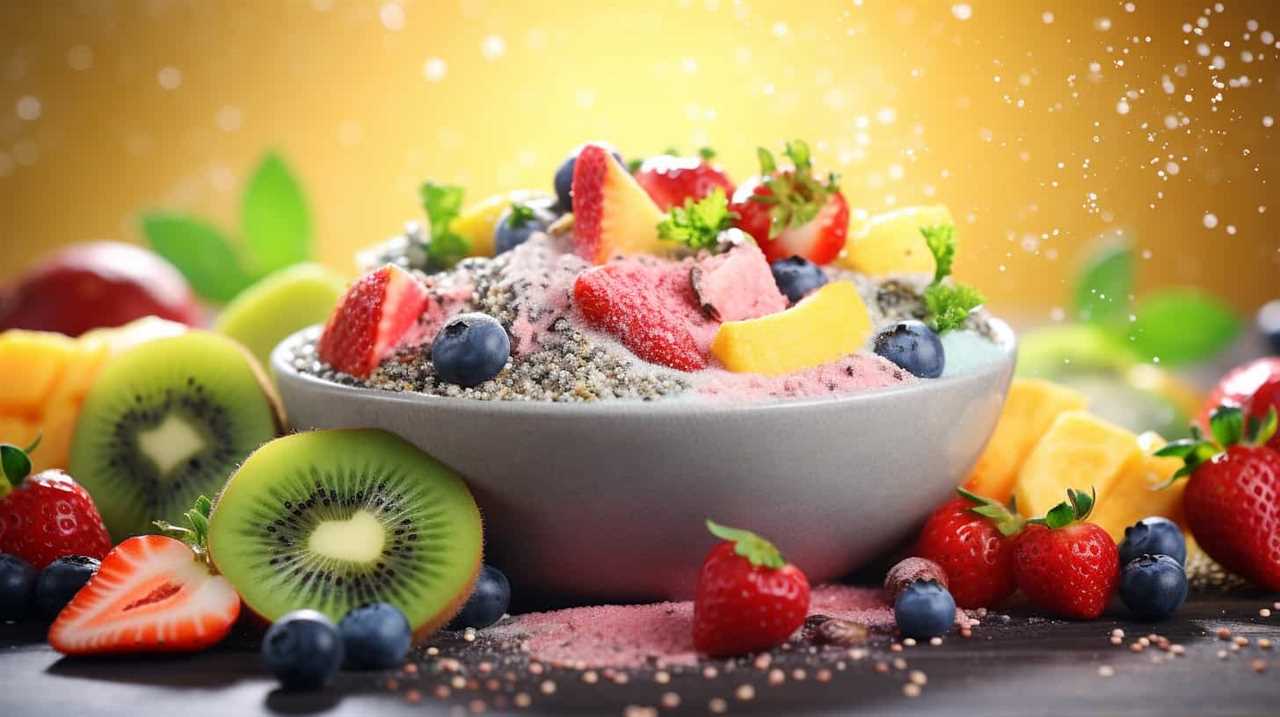
- Chia seeds can absorb up to ten times their weight in liquid, increasing the risk of obstruction in the throat.
- Children, older adults, and individuals with swallowing difficulties are particularly vulnerable.
- It’s crucial to drink enough water when consuming chia seeds to prevent them from swelling in the throat.
- Care should be taken to avoid consuming large amounts of dry chia seeds at once to minimize the risk of choking.
In addition to the potential choking hazard, it’s also important to be aware of the risk of contamination in chia seeds. Contaminants such as bacteria, mold, or pesticides can pose health risks. Therefore, it’s advisable to purchase chia seeds from reputable sources and store them properly to reduce the risk of contamination.
Excessive Consumption and Health Risks
Consuming an excessive amount of seeds can lead to various health risks, including digestive issues and nutrient imbalances. While moderate seed consumption offers nutritional benefits, excessive intake can have detrimental effects on our health. Let’s explore why this is the case.
Digestive issues are a common consequence of excessive seed consumption. Seeds are high in fiber, which is beneficial for regulating bowel movements. However, consuming too many seeds can overwhelm the digestive system, leading to bloating, gas, and even constipation.
Moreover, excessive seed consumption can result in nutrient imbalances. Seeds are rich in certain nutrients like omega-3 fatty acids and minerals. However, relying solely on seeds for these nutrients may lead to an imbalance in other essential nutrients such as proteins, carbohydrates, and vitamins.

To reduce the risk of these health issues, it is important to incorporate seeds in moderation and diversify our diet with other nutrient-rich foods. Strategies for reducing seed consumption in our diet include portion control, focusing on a varied diet, and seeking guidance from a nutritionist to ensure a well-balanced intake.
| Health Risks of Excessive Seed Consumption | Strategies for Reducing Seed Consumption in Diet |
|---|---|
| Digestive issues (bloating, gas, constipation) | Practice portion control |
| Nutrient imbalances (lack of essential nutrients) | Diversify diet with other foods |
| Seek guidance from a nutritionist |
Frequently Asked Questions
Are There Any Other Seeds Besides Chia Seeds That Can Cause Allergic Reactions?
Other seeds, such as flaxseeds and sesame seeds, can also cause allergic reactions. It’s important to be aware of potential allergens and consult with a healthcare professional if you experience any adverse symptoms. Additionally, chia seeds offer numerous health benefits.
Can Consuming Chia Seeds Lead to Constipation or Diarrhea?
Chia seeds, as a source of dietary fiber, can potentially lead to constipation or diarrhea. It’s important to note the effects of chia seeds on bowel movements and the possible link to gastrointestinal discomfort.
What Medications Should Be Avoided While Consuming Chia Seeds?
While consuming chia seeds, it is important to consider medication interactions. Some medications, such as blood thinners, may interact with chia seeds. It is advised to consult a healthcare professional for dosage recommendations and potential risks.
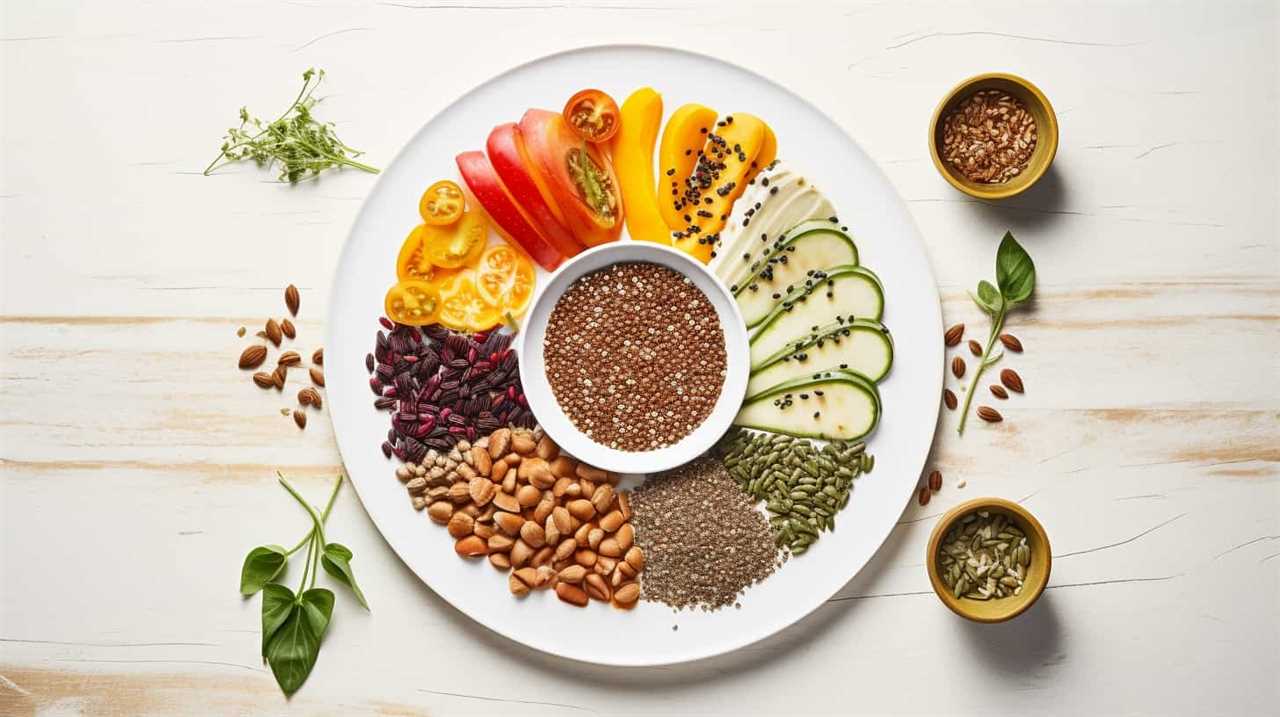
Can Chia Seeds Cause Choking in Children?
Chia seeds can pose choking hazards for children due to their small size and ability to absorb liquid. To ensure safety, it is advised to prepare chia seeds properly, avoid giving them to young children, and supervise their consumption.
What Are the Symptoms of Excessive Consumption of Chia Seeds?
Excessive consumption of chia seeds can result in digestive issues and allergic reactions. These symptoms may include bloating, diarrhea, and skin rashes. It is important to consume seeds in moderation to avoid potential health risks.
Conclusion
In conclusion, while seed consumption can offer numerous health benefits, it’s important to be aware of potential health risks. Allergic reactions, gastrointestinal issues, medication interactions, and the choking hazard of chia seeds are all factors to consider.
It’s crucial to consume seeds in moderation and consult a healthcare professional if you have any concerns.

As the saying goes, ‘Everything in moderation’ applies to seed consumption for optimal health and well-being.









